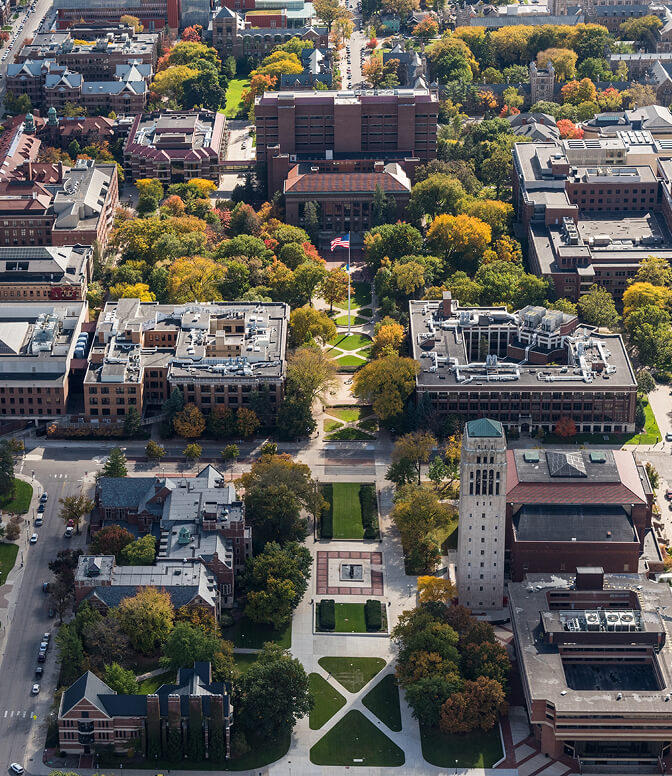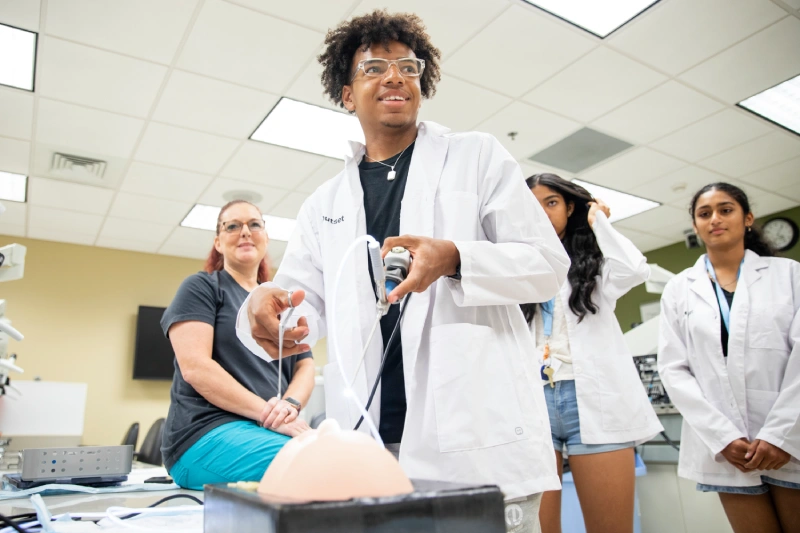A medical career is an exciting and rewarding goal for many high school students. The desire to positively impact society and take on a respected, challenging role in healthcare can be a powerful motivator. While the journey to becoming a doctor requires dedication and years of education, students, parents, and advisors must understand what that path looks like and how to navigate it.
In this article, we’ll map out the journey from high school to a medical career, highlighting key steps to help aspiring doctors get started on the right path.
Educational Pathway to Becoming a Doctor
Embarking on the journey to becoming a doctor is a multi-step process that unfolds over several years, involving rigorous academic study, practical training, and personal development.
Undergraduate / Pre-med Education (4 years)
Your journey toward a medical career starts with a four-year undergraduate degree. While you can choose your major, selecting something like biology, chemistry, or a related science can be helpful. These subjects will prepare you for the Medical College Admission Test (MCAT) and give you the foundation for medical school prerequisites, which usually include biology, chemistry, physics, and math.
Focusing on doing well academically is important, as medical school admissions are very competitive. But remember, grades aren’t everything. Building connections with professors and mentors can lead to strong recommendation letters. Getting involved in extracurricular activities like volunteering in healthcare or participating in research will also make your application stand out.
Gaining experience in research is another great way to enhance your understanding of science and develop valuable skills for a career in medicine. As you plan your undergraduate years, be sure to check the specific requirements of the medical schools you're interested in to make sure you're on the right track.
Medical School (4 years)
Medical school typically spans four years, divided into pre-clinical and clinical phases. The first two years are largely classroom-based, covering fundamental sciences such as anatomy and biochemistry.
Your education during this phase is rigorous, laying the foundation needed for hands-on patient care during the latter two years. The clinical phase involves rotations across specialties, where you’ll gain direct patient care experience and identify possible areas for specialization.
Getting involved in extracurricular activities, like taking on leadership roles or volunteering, is a great way to build your skills outside the classroom. These activities help you develop important qualities like time management, communication, and teamwork, which are essential for a career in medicine.
During medical school, you'll also need to pass important exams, like the USMLE Step 1 and Step 2. These tests assess your medical knowledge and readiness for the next step in your journey: residency.
Residency (3-7 years depending on specialty)
After medical school, the residency begins, where you'll receive specialized training in your chosen field while working in clinical settings. Residency can last from three to seven years, depending on the specialty.
During this time, you'll get hands-on experience by working with patients under the guidance of experienced doctors. It’s a chance to put everything you've learned into practice while improving your skills in your chosen specialty.
This stage can be tough because you'll have a lot of responsibility and new things to learn, but it's also incredibly rewarding as you gain more confidence and expertise.
Residents must pass the final part of the United States Medical Licensing Examination (USMLE), which ensures you’re ready for independent practice. This stage is vital for clinical competence and professional growth, building confidence as you step closer to becoming a fully licensed physician.
Fellowship (Optional, 1-3 years)
After residency, pursuing a fellowship lets you specialize even further in a specific area of medicine, like cardiology, oncology, or pediatric surgery. While it's not required, a fellowship can help you take on advanced roles in clinical settings or academia and give you the chance to work on more complex cases and learn about the latest medical practices.
Becoming a doctor is a long journey, from your undergraduate studies to the option of a fellowship, but it’s one that requires dedication, resilience, and a love of learning. By focusing on excelling academically, gaining research experience, and staying involved in your community, you'll set yourself up for a rewarding career in medicine.
Factors Affecting Time to Become a Doctor
Becoming a doctor is a journey that varies significantly in duration based on several factors. Let's delve into these influences to understand how they affect the time required to become a doctor.
Delayed Entry and Gap Years
Gap years are a common factor leading to delayed entry into medical school. Many aspiring doctors choose to take time off after their undergraduate studies to gain valuable experiences that can bolster their medical school applications. During these gap years, individuals often engage in work, research, or volunteer opportunities, enriching their personal development and providing a clearer context for their medical aspirations.
Part-Time Study
Part-time study is another factor that influences the length of medical training. This approach allows students to balance personal commitments, such as work or family responsibilities, by spreading their coursework over a longer period. As a result, the time taken to complete medical schooling increases. In some cases, what would typically require four years of full-time study may extend to six years or more when a student opts for a part-time path.
Start Strong: How to Prepare for a Medical Career in High School
Getting a head start in high school can make a big difference in your journey to a medical career. Taking the right classes, getting involved in volunteer work, and finding a mentor can help you build a strong foundation and set you up for success in the future.
Subjects of Focus
Identifying key subjects to focus on during high school can significantly propel students toward their desired educational and career paths. Strategic course selection enables students to align their studies with their interests and long-term goals. For example, students interested in medicine can benefit from early exposure to Science and Math through Advanced Placement (AP) or Dual Enrollment courses, which may also provide college credit.
By meeting with guidance counselors early, students can map out a comprehensive plan for high school, ensuring they meet graduation requirements and enhance their readiness for college-level coursework.
Volunteering and Extracurricular Activities
Getting involved in volunteering and extracurricular activities isn’t just about filling up your schedule—it’s a game-changer for both personal growth and future opportunities. These experiences go beyond textbooks, helping you build real-world skills like teamwork, leadership, and communication.
Plus, colleges love to see students who take initiative. If you're thinking about a career in healthcare, joining a pre-med club, volunteering at a hospital, or getting involved in science programs can give you hands-on experience and a glimpse into your future profession.
Academic Advisors and Mentorship
Having the right guidance in high school can make a huge difference. Academic advisors and mentors help you choose the best courses, plan for college, and navigate challenges along the way. They can also connect you with valuable opportunities, from networking to scholarships.
By seeking their advice, getting involved in meaningful activities, and building a strong academic foundation, you’ll set yourself up for success—both in college and in your future career.
Tips for High School Students Considering a Healthcare Career
Thinking about a career in medicine? It's an exciting and rewarding path, but it takes planning and dedication from the start. Here are some tips to help guide you as you consider your future in the medical field:
Understand the "Unwritten Rules"
Medicine has some hidden rules that you won't find in textbooks, like how to communicate with patients or navigate medical school culture. A mentor can help you figure out these important, behind-the-scenes lessons, making it easier to adapt when you're in med school.
Practice Real-World Skills
If you want to get ahead, start building practical skills. Try programs where you can practice things like interpreting medical images or understanding how the body works. The more you can learn now, the more prepared you'll be for medical school.
Explore Different Areas
Medicine is huge, with lots of different fields to explore. Try shadowing doctors or volunteering in hospitals to see what types of medicine interest you. It will help you get a feel for the work and see if it’s something you want to pursue.
Get a Mentor
Mentorship programs are a great way to see what working in medicine is really like. Programs like those at Boston School of Medicine can help you learn more about the field, boost your academic skills, and guide you through the next steps. Plus, you'll have the chance to connect with professionals who can open doors for you in the future.
Stay Committed and Curious
The road to becoming a doctor is long, but staying curious and committed to learning will set you up for success. Keep challenging yourself, ask lots of questions, and always look for ways to expand your knowledge and experience.
Final Thoughts
Becoming a doctor is a long and challenging journey, but with the right preparation, it can be incredibly rewarding. If you're a high school student considering medicine, start by working with your counselors to make sure your classes and extracurriculars align with your goals.
Gaining real-world experience is key—volunteer work, research, or internships in healthcare settings can boost your college applications and give you a deeper understanding of the field.
In the end, a mix of academic effort, hands-on experience, and financial planning will set you up for success. Stay committed to learning, and you’ll be well on your way to a meaningful and fulfilling career in medicine.









%20(1).jpg)




.png)








